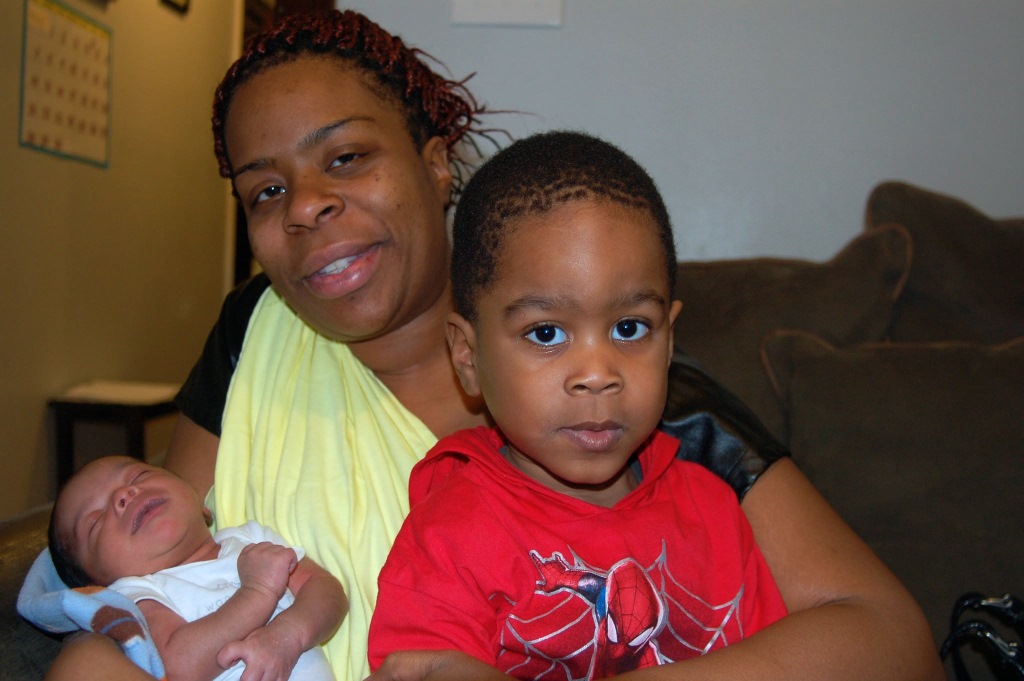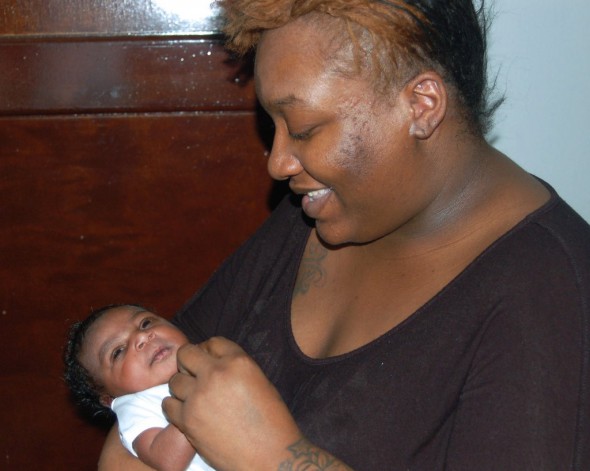Shelter for Homeless Women Changes Focus
After 20 years, Nia Imani Family Inc. will now serve only first-time mothers and children.

Nicole Roundtree holds her week-old son Joel and her 3-year-old son Elijah in her apartment at Nia Imani. Photo by Andrea Waxman.
When Nicole Roundtree lost her cleaning job at the Milwaukee County Secure Juvenile Detention Center in June, she and her 2-year-old son Elijah ended up living in her car. For more than five months, the pregnant 29-year-old mother searched for shelter and work without success.
Finally in early December, she found Nia Imani Family Inc., Milwaukee’s only long-term transitional living facility for homeless women and children, through an online search.
“When we moved in, my son and I were extremely happy. We got to sleep after months and months of pain and depression. We finally got to get some sleep,” repeated Roundtree, who was sick with respiratory ailments for much of that time.
After more than 20 years providing shelter and a structured program that teaches life skills and supports a path to independence, Nia Imani is changing its focus. Having worked with homeless mothers of all ages and circumstances, Belinda Pittman-McGee, founder and executive director, has come to believe that young first-time mothers and their children benefit most from the program.
Pittman-McGee also plans to expand Nia Imani’s influence beyond the 13 mothers it can house by opening Nia Umoja, a community outreach center for nonresident mothers. Nia, Imani and Umoja are Swahili words for purpose, faith and unity, three of the seven principles of Kwanzaa.
“This is a time when these young women can re-imagine their lives. This is the best time to intervene, while they’re still innocent, before they become stressed, cynical, angry and tired from dragging their children through homelessness, and before the damage starts being done to the children,” said Nia Imani board president Julilly Kohler.
Kalita Smith, 25, another young mother living at Nia Imani, also lost her apartment after losing a job. Pregnant for the first time, Smith began to feel sick in her second trimester and missed a lot of work at the childcare center where she was employed. A pregnancy counselor at another nonprofit referred her to Nia Imani.
“I think Nia Imani chose me based on need and on my mindset,” Smith said. “I think they choose women who want to get on their feet. They choose women who they think can progress in their program, not those just looking for a place to live,” she added.
For Smith, a high school graduate with 30 college credits from two for-profit colleges, the most meaningful part of Nia Imani is the life skill classes and the group discussions “that have to do with the inner things, the reasons why we hit those roadblocks in life.” These discussions touch on issues such as depression and lack of support that keep women from progressing in life, she said.
Smith appreciates the understanding of Nia Imani’s staff, who also have experienced homelessness. “Here, we know they have been in our shoes. We can go to them and talk to them and get advice from them. It makes you open up and feel trust in them,” she said.
Pittman-McGee has been replacing the women who complete the residential program with first-time pregnant women ages 19 to 24 and, in a few cases, pregnant women with one young child. She views these young women as full of hope and motivated to grow during a critical time in their lives.
The new Nia Umoja community outreach center will be located in a storefront facing Vliet Street, adjacent to the shelter on 25th Street. It will offer young mothers a safe place to come in off the street and take advantage of programs and support services similar to those offered to shelter residents.
The organization is raising funds to renovate the space, where it plans to install laundry and kitchen facilities, reading and computer rooms, a children’s play area, and space for meetings, training, yoga and massage therapy. But because the need is great, Pittman-McGee said, she plans to start offering life skills support groups there as soon as she can get the necessary permits, hopefully, in May.
Building support networks
Pittman-McGee teaches women that they can create their own support networks and help each other build better lives. She noted that it takes time to reach the goal of self-sufficiency. While young mothers who are on public assistance can get help with food, clothing and healthcare, they have to pay rent on their own.
With a maximum Wisconsin Works (W-2) income of $673 per month, it is financially impossible for the young mothers to live alone, Pittman-McGee said. Pointing out that many people, including college students and young professionals, share housing to make it more affordable, she teaches residents the skills and attitudes it takes to share housing with other mothers.
“They’re learning and seeing how becoming closer and providing support to each other is a benefit. They can share in the expenses and then they can plan their lives to part a few years down the road, when they get jobs and can make more (money),” Pittman-McGee explained.
Trauma-informed care includes evaluating people for exposure to trauma and tailoring methods to meet their unique needs. It is based on the Adverse Childhood Experiences (ACE) Study, which assesses the association between childhood maltreatment and later-life health and well being, and a subsequent study that looked at similar experiences among poor urban residents of Philadelphia.
Nia Imana has formed a partnership with SaintA, a local social service agency, which is a national leader in trauma-informed care, according to its Web site.
Tim Grove, chief clinical officer at SaintA, said the organization is training Nia Imani’s staff in trauma-informed care and Pittman-McGee is reciprocating by training SaintA’s staff in working with homeless women and children.
Other Nia Imani partners include the City of Milwaukee Health Department, The Parenting Network, which facilitates parenting groups and provides monthly in-home parent coaching, and Davis-Laack Stress & Resilience Institute.
Roundtree said the shelter and its programs offer “a lot of help, structure and discipline that I did need in my life.” Though her doctor had been worried about her health and its effect on her baby, Roundtree gave birth to healthy boy on Feb. 8.
Happy to be in stable housing with the opportunities for personal growth that Nia Imani offers, Roundtree can now envision a future as a dedicated mother with a job and a place to live.
She said she wants her sons’ lives to be different from her own childhood. “I want them to be able to come to me to talk about anything. I’ll be there for them anytime that they need me, no matter what.”
This story was originally published by Milwaukee Neighborhood News Service, where you can find other stories reporting on fifteen city neighborhoods in Milwaukee.






















